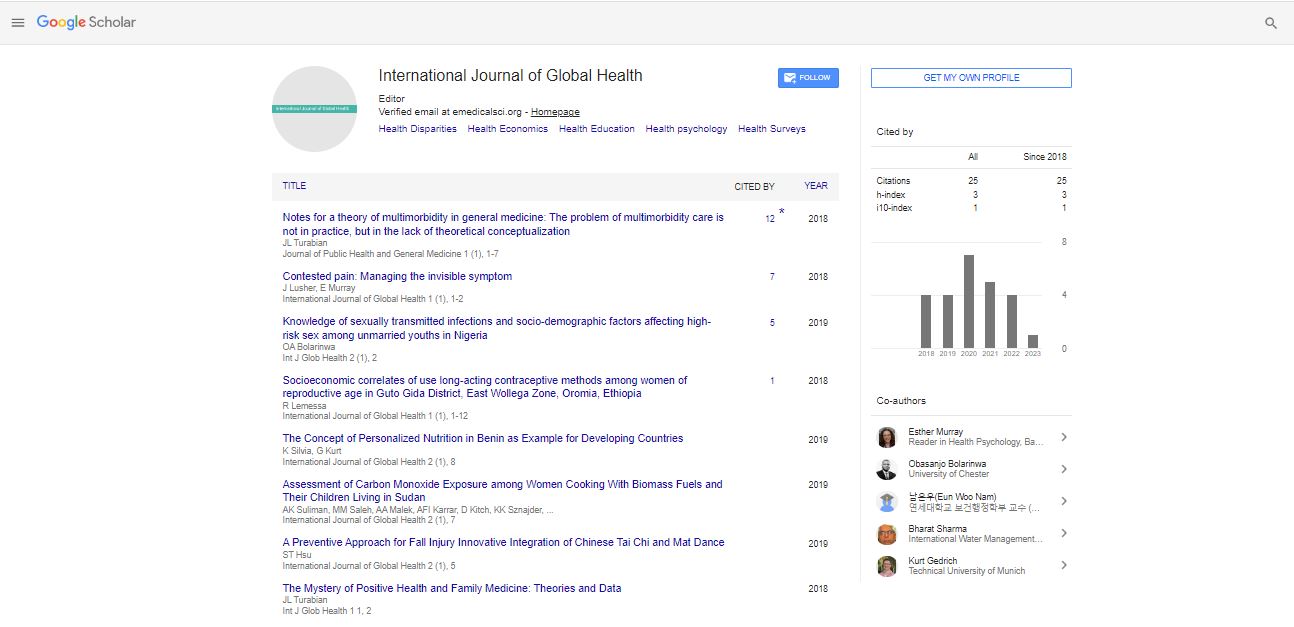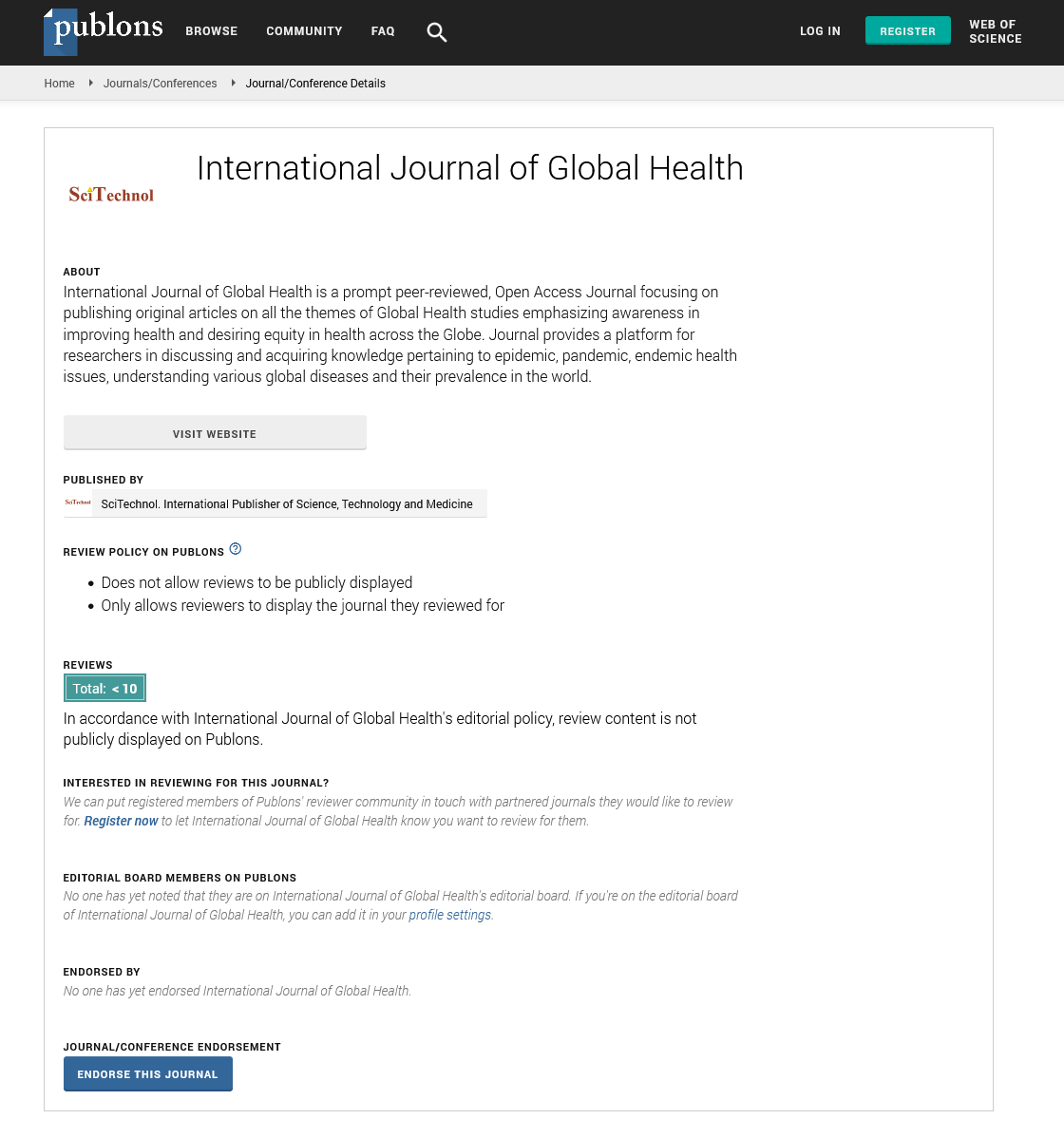Opinion Article, Int J Glob Health Vol: 6 Issue: 4
Healthcare Systems Around the Globe: Comparative Analyses and Best Practices
Wilson Estival*
1Department of Health Policy and Management, Serenity School of Public Health, Calmtown, United Kingdom
*Corresponding Author: Wilson Estival,
Department of Health Policy and
Management, Serenity School of Public Health, Calmtown, United Kingdom
E-mail: estival6273wilson@ssphi.edu.uk
Received date: 27 November, 2023, Manuscript No. IJGH-24-125958;
Editor assigned date: 29 November, 2023, Pre QC No. IJGH-24-125958 (PQ);
Reviewed date: 14 December, 2023, QC No. IJGH-24-125958;
Revised date: 21 December, 2023, Manuscript No. IJGH-24-125958 (R);
Published date: 28 December, 2023, DOI: 10.4172/Ijgh.1000199
Citation: Estival W (2023) Healthcare Systems Around the Globe: Comparative Analyses and Best Practices Int J Glob Health 6:4.
Description
The examination of healthcare systems around the globe involves a nuanced exploration of diverse models, structures, and strategies that nations employ to provide healthcare to their populations. "Healthcare Systems Around the Globe: Comparative Analyses and Best Practices," as investigated in the International Journal of Global Health, offers valuable insights into the strengths, challenges, and best practices of different healthcare systems. One fundamental distinction in healthcare systems lies between those that embrace universal healthcare and those utilizing multi-payer models. Nations with universal healthcare, such as the United Kingdom and Canada, provide healthcare services to all residents irrespective of their ability to pay. In contrast, multi-payer systems, as seen in countries like Germany and Switzerland, involve a combination of public and private insurance options.
The balance between public and private provision of healthcare varies globally. Some countries, like Sweden and Norway, rely extensively on publicly funded and operated healthcare services. Others, such as the United States and Germany, incorporate a mix of public and private providers, leading to a diverse healthcare landscape. Healthcare systems differ in their emphasis on primary care versus specialized care. Nations like Brazil and Cuba prioritize a robust primary care system, promoting preventive services and early intervention. In contrast, systems in countries like the United States and Germany may place a greater emphasis on specialized and tertiary care.
The degree of government involvement in healthcare varies. Some countries, like the United Kingdom, have a nationalized healthcare system with extensive government control and regulation. Others, such as Switzerland, rely on strong governmental oversight while allowing for a higher degree of private sector involvement. Financing models also exhibit diversity, ranging from tax-funded systems to social insurance and out-of-pocket payments. Scandinavian countries typically fund healthcare through high taxes, while countries like Singapore implement a unique system of mandatory health savings accounts and catastrophic insurance. Healthcare systems with a strong emphasis on primary care often demonstrate better health outcomes and cost-effectiveness. Prioritizing primary care facilitates early detection of health issues, preventive interventions, and the management of chronic conditions, contributing to overall population health. Ensuring universal access to essential healthcare services is considered a best practice. Countries with comprehensive coverage, regardless of socioeconomic status, demonstrate greater equity and improved health indicators. This approach aligns with the goal of achieving Universal Health Coverage (UHC).
Effective healthcare systems leverage integrated health information systems to enhance coordination, communication, and data-driven decision-making. Robust information systems contribute to better patient outcomes, streamlined care delivery, and population health management. Healthcare systems that prioritize prevention and public health strategies demonstrate long-term benefits. Initiatives such as vaccination programs, health education, and disease prevention contribute to reducing the burden of illness and promoting overall well-being.
Best practices include inclusive governance structures that involve stakeholders from various sectors, including government, healthcare providers, insurers, and the public. Engaging stakeholders in decisionmaking processes enhances the legitimacy and effectiveness of healthcare policies. Healthcare systems committed to continuous quality improvement foster a culture of learning and adaptation. Regular evaluations, benchmarking against best practices, and the implementation of evidence-based interventions contribute to the ongoing enhancement of healthcare delivery.
A well-trained and motivated healthcare workforce is crucial for the success of healthcare systems. Best practices involve investing in education, training, and professional development to ensure a skilled workforce capable of addressing diverse health challenges. Despite best practices, healthcare systems face challenges such as rising healthcare costs, disparities in access, and the impact of demographic shifts. Adapting to evolving healthcare needs, addressing workforce shortages, and navigating political and economic realities are ongoing considerations for policymakers and healthcare leaders.
Conclusion
"Healthcare Systems Around the Globe: Comparative Analyses and Best Practices" highlights the complexity and diversity of healthcare models worldwide. While there is no one-size-fits-all approach, understanding the strengths and challenges of different systems can inform efforts to enhance healthcare delivery, promote equity, and achieve optimal health outcomes for diverse populations. Continuous dialogue, shared learning, and a commitment to evidence-based practices are essential for the ongoing improvement of healthcare systems globally.
 Spanish
Spanish  Chinese
Chinese  Russian
Russian  German
German  French
French  Japanese
Japanese  Portuguese
Portuguese  Hindi
Hindi 
